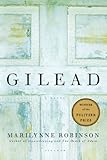 Marilynne Robinson’s Gilead is a small miracle, a novel in the form of a letter from the Reverend John Ames, 76 and dying, to his 7-year-old son. There are strands of plot in the book — flashbacks involving Ames’ abolitionist grandfather; the explanation of how Ames met his young wife and became a father so late in life; and the story of his friendship with his neighbor Reverend Robert Boughton. But Robinson is really interested in extended rumination, charting Ames’ thoughts about mercy, mortality, forgiveness, grace and doubt in great detail. The pace of these thoughts requires an initial patience from the reader that is amply rewarded. The book’s modest, carefully planed language and its concern with primary human needs make it timeless, but it’s hard not to also marvel at and appreciate the way it functions as a timely corrective. While the proudly ignorant hardcore religious right and arrogant preachers like Richard Dawkins shout past each other, Robinson addresses faith in a way that is both spiritually generous and intellectually serious. Here is religion not as a political cudgel or a claim for moral superiority but as a thoughtful balm for an attentive individual soul.
Marilynne Robinson’s Gilead is a small miracle, a novel in the form of a letter from the Reverend John Ames, 76 and dying, to his 7-year-old son. There are strands of plot in the book — flashbacks involving Ames’ abolitionist grandfather; the explanation of how Ames met his young wife and became a father so late in life; and the story of his friendship with his neighbor Reverend Robert Boughton. But Robinson is really interested in extended rumination, charting Ames’ thoughts about mercy, mortality, forgiveness, grace and doubt in great detail. The pace of these thoughts requires an initial patience from the reader that is amply rewarded. The book’s modest, carefully planed language and its concern with primary human needs make it timeless, but it’s hard not to also marvel at and appreciate the way it functions as a timely corrective. While the proudly ignorant hardcore religious right and arrogant preachers like Richard Dawkins shout past each other, Robinson addresses faith in a way that is both spiritually generous and intellectually serious. Here is religion not as a political cudgel or a claim for moral superiority but as a thoughtful balm for an attentive individual soul.
An audio excerpt from Gilead.
More Best Fiction of the Millennium (So Far)
Best of the Millennium, Pros Versus Readers









